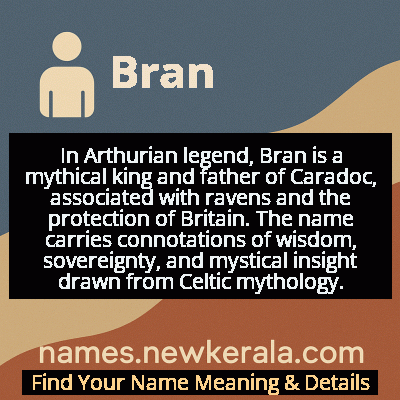Bran Name Meaning & Details
Origin, Popularity, Numerology Analysis & Name Meaning of Bran
Discover the origin, meaning, and cultural significance of the name BRAN. Delve into its historical roots and explore the lasting impact it has had on communities and traditions.
Name
Bran
Gender
Male
Origin
Arthurian
Lucky Number
8
Meaning of the Name - Bran
In Arthurian legend, Bran is a mythical king and father of Caradoc, associated with ravens and the protection of Britain. The name carries connotations of wisdom, sovereignty, and mystical insight drawn from Celtic mythology.
Bran - Complete Numerology Analysis
Your Numerology Number
Based on Pythagorean Numerology System
Ruling Planet
Saturn
Positive Nature
Ambitious, efficient, realistic, and authoritative.
Negative Traits
Materialistic, stressed, confrontational, and can be overly ambitious.
Lucky Colours
Dark blue, black.
Lucky Days
Saturday.
Lucky Stones
Blue sapphire, amethyst.
Harmony Numbers
2, 4, 6.
Best Suited Professions
Business leaders, managers, financial services, law enforcement.
What People Like About You
Leadership, determination, organizational skills.
Famous People Named Bran
Bran the Blessed
Mythical King
Legendary giant king of Britain and father of Caradoc in Arthurian legend
Bran mac Febail
Mythical Explorer
Hero of Irish mythology who journeyed to magical islands in the Otherworld
Bran Stark
Fictional Character
Three-eyed raven and mystical figure in Game of Thrones series
Name Variations & International Equivalents
Click on blue names to explore their detailed meanings. Gray names with will be available soon.
Cultural & Historical Significance
Bran's story intersects with important mythological themes including sovereignty, sacrifice, and the protection of Britain. His most famous legend involves his journey to Ireland to rescue his sister Branwen, resulting in a catastrophic war where only seven survivors return to Britain. The subsequent burial of his head at the White Hill in London (where the Tower of London now stands) created the foundation for the legend that Britain would remain safe as long as his head remained buried there. This connects Bran to the concept of the 'Dormant King' who protects the land even in death, a theme that resonates throughout British mythological history.
Extended Personality Analysis
Individuals named Bran are typically associated with wisdom, protection, and mystical insight, reflecting the characteristics of their mythological namesake. They often exhibit strong leadership qualities combined with a deep sense of responsibility toward their community or family. Like the raven that shares their name, they tend to be observant, intelligent, and capable of seeing patterns and connections that others might miss. There's often a prophetic or visionary quality to their thinking, along with practical wisdom that makes them natural counselors or guides.
Brans are frequently characterized by their loyalty and protective nature, particularly toward those they consider under their care. They possess a combination of earthly practicality and spiritual depth, able to navigate both the material and mystical realms with equal competence. While they can be formidable when defending their principles or loved ones, they typically prefer peaceful resolution and have a strong sense of justice. Their strength often lies in their patience and ability to wait for the right moment to act, much like the mythological Bran who understood the importance of timing and sacrifice for the greater good.
Modern Usage & Popularity
In contemporary times, Bran has seen a resurgence in popularity, particularly among parents seeking Celtic or Arthurian names with strong mythological roots. While not among the most common names, it has gained traction in the UK, Ireland, and among fantasy enthusiasts worldwide. The character of Bran Stark in Game of Thrones significantly boosted the name's visibility and appeal in the 2010s. Modern usage often emphasizes the name's connection to nature (through the raven meaning) and its Arthurian heritage, making it appealing to parents looking for names that are both traditional and distinctive. The name maintains a steady but modest usage pattern, typically ranking outside the top 500 names in English-speaking countries but showing consistent presence.
Symbolic & Spiritual Meanings
Bran carries rich symbolic meanings rooted in its Celtic origins and Arthurian connections. Primarily, it symbolizes the raven - a bird representing prophecy, intelligence, and the connection between worlds in Celtic tradition. The raven's ability to fly between the earthly and spiritual realms makes Bran a name associated with vision, mystery, and the ability to see beyond surface reality. It also symbolizes protection and sovereignty, drawing from the legend of Bran's buried head guarding Britain. The name embodies the concept of the 'king in the mountain' or dormant protector who watches over the land. Additionally, Bran represents transformation and rebirth, connected to the cauldron of rebirth in Welsh mythology and the cyclical nature of leadership and guardianship in British legendary history.

